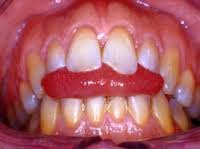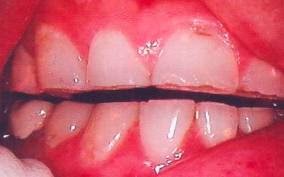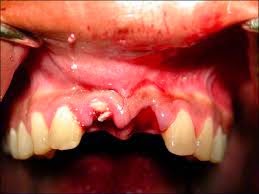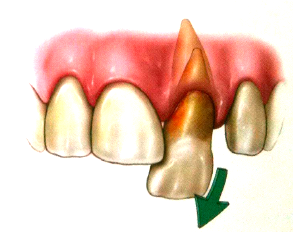Pain is one of the main reasons why people go to dentists. Any injury to the teeth or gum should not be ignored because nerves and blood vessels can be damaged and it can also lead to an infection.
If an infection is not treated it can spread to other parts of the head and neck and in certain cases can be life-threatening. Hence one must visit a dentist as soon as a dental emergency occurs.
Dentists today are skilled to deal with such emergencies. They have knowledge of pain management and ways to restore the teeth. Here are some of the problems that can happen to your teeth after a fall or an accident.
FRACTURED OR CHIPPED TOOTH

Teeth can be fractured or chipped because of biting down on something hard, being hit on the face or mouth, falling, having dental cavities that weaken the tooth or having large, old amalgam fillings that don’t support the remaining enamel of the tooth.
What you can do:
There is no way to treat a chipped tooth at home, one must visit their dentist. It may not pain but there could be sensitivity to hot and cold fluids due to nerve damage. Also, there might not be any pain on biting but it may occur after releasing the bite. In case of a broken tooth see your dentist soon.
A damaged nerve requires a root canal. Before you reach the dentist, wash your mouth with warm water and apply pressure with a piece of gauze on any bleeding area till the bleeding stops. Apply a cold pack to the cheeks and the lips over the broken tooth. This helps reduce any pain or swelling. If in excess pain take a pain killer.
What your dentist can do:

If it is a minor crack which involves only the enamel, your tooth does not need any treatment. All it needs is polishing of the smooth edges. However, if the tooth is cracked as a whole all the way until the nerve or has a minor chip, the tooth needs a restoration along with a cap to prevent the damage from getting worse.
But if the pulp is damaged a root canal treatment is required. In case of a broken cusp, the only restoration is required or a crown. A broken cusp, however, does not damage the pulp. In case your tooth has split into two parts due to a vertical crack, in the molars that have more than one root, it will be possible to keep one of the roots which would be root canal treatment followed by a cap.
KNOCKED OUT TOOTH

A knocked-out tooth is also known as an avulsed tooth. An avulsion is the complete displacement of a tooth from its socket. The treatment for the permanent tooth is immediate replantation. However, the milk tooth should be left untreated due to the risk of damaging the permanent tooth and the dental crypt.
What you should do:
- Rinse the tooth under tap water.
- Hold the tooth only by its crown surface and not by the root, to prevent any damage of cells or fibers on the root surface.
- Immediately try re-implanting the tooth.
- If re-implantation does not happen at home, then place the tooth in your mouth in your vestibule and take it to the dentist. This is contraindicated in children. In such cases, the tooth can be carried in milk.
- Always remember the tooth must be re-implanted in 40 minutes for the best prognosis.
- If multiple teeth are knocked off, its best not to attempt at placing the tooth in its sockets because the person will not know what tooth to place in which socket. Also, it’s important to remove all the debris from the tooth before its placement. Hence an immediate visit to a dentist is more advisable.
What your dentist can do:
The dentist will first flush out all the debris from the socket and will simply push the tooth back into its socket if the bone or tooth is not broken. A root canal treatment will be needed, but whether immediately or after a while depends on the damage. The tooth might require splinting as well. However, the tooth must be examined every 3 to 6 months.
PARTIALLY DISLODGED TOOTH

Sometimes a tooth is knocked out or loosened because of an injury. If there is no damage to the tooth, bone and the surrounding blood vessels, the tooth can be saved.
What you can do:
Visit your dentist immediately and keep your tooth safe in your mouth. Over the counter pain, relievers can be taken and a cold pack can be applied until you reach the dentist.
What your dentist can do:
Your dentist will give you some anesthesia and slip the tooth back inside after cleaning the area. He will then splint the teeth with the adjacent teeth. If there is damage to the nerves or the blood supply then the dentist will perform a root canal treatment. Post the root canal, placement of a cap will be essential.
SOFT TISSUE INJURY
The tissues of the mouth are very soft and delicate. Since they contain a lot of nerves it can be painful on hurting them.
What you can do:
Place a gauze piece on the area and apply pressure to stop bleeding. Rinse your mouth with a mild saltwater solution. Put ice on it for 10 – 15 minutes.
What your dentist can do:
Once you go to the emergency room the dentist must wash the area and remove any dirt or debris and see for loose or damaged teeth. Stitches may be needed to close the wound.











75 thoughts on “What are the common dental problems can happen after an accident?”
Great article. The latest technology has helped the dentist and the whole dental studies to acquire success in its field
Informative read
Informative
Very informative…
Informative.
It’s very help full
The earlier u come it is good for patient and dentist to save or repair the teeth.
Informative article
Informative article
Very informative…
Great information
Very informative
Informative
It’s very help full
Nice article
Good information.
Great information
Useful information
Good information
Very good information
Good article
Article is really amazing
Helpful
Great information!
Good article
Informative.
Informative article
Nice article
Well explained.
Helpful article
Very well explained
Nce?
Very helpful
The article was very informative and quite helpful.Thank you
Good information.
Very informative…
Very helpful
Great information
Very informative and helpful
Thanks for sharing this article. Very helpful.
Informative
Very informative.
Helpful and informative article
Very helpful..
Indeed useful
Nice article
very informative
Useful article
helpful blog in lockdown
Very informative
Thank you for sharing this information
Great information
Well written.
Very well explained, good article.
Nice information.
Awesome
Very informative
Helpfull article
Nice information
Well explained article
Nice information
Thank you sharing such articles.
Good information
Nice article ???
Nice ?
Helpful information
Great information ??
Very helpful
Very helpful
Good information
Very useful information to the patient.
Very useful
Informative blog
The article really helps!!!
Falling and breaking the front teeth is so common in childhood . This article really helps for immediate care procedures that can be done .